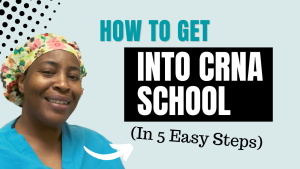Your personal essay will be read along with your application so you should think about how to tell your story in a way which will complement it. You also want to maximize your essay so the admissions committee will remember you after reading it.
This is great because the reader begins to care for you before they even meet you in person. And of course the ultimate goal is for you to receive an invitation to interview for a spot in a nurse anesthesia program.
Hopefully I’ve convinced you the importance of a well written personal statement. Here are 9 ways to maximize your personal statement and impress the admissions committee.
Read: 3 Best Ways to Show, Not Tell on Your Personal Essay
Make your story radiate
Your story should have a beginning, a middle, and an end. So you need to tell your readers not only what happened, but also why your story is significant. Again, the first paragraph has to be interesting so the reader will stick around and keep reading. This is why you want to wow them right off the bat. Your story should say a lot about you and also show you are a good fit for their nurse anesthesia program. And show both the personal and professional growth over the years which has prepared you to later become a CRNA.
Make yourself sound interesting
This just means how do you get people to listen to you? The way to accomplish this is to talk about interesting things. Sorry guys, not trying to dumb this down. But it’s possibly quite this simple. First you need to pick one key experience and talk about that. Second, take the reader on your journey to nurse anesthesia school. While you are at it, speak on your background. And be sure to include examples as you go. This is your opportunity to paint a picture of the interesting person you are and what you can bring to the profession.
Don’t ramble
Rambling is a common problem when writing any kind of essay. When you start rambling, you lose your readers attention and possibly a chance to get an interview for program you have applied to. There are several ways to prevent yourself from rambling. Each of these ways will allow you to organize your thoughts and personal statement better. Here are the ways you can avoid rambling:
- Frame your thoughts in an organized fashion
- Don’t cram to much information into the essay
- Avoid long sentences- a period as a quick fix
- Always think what is the main point
By following these suggestions, hopefully this will keep you on point and prevent you from rambling too much. So the point is try not to ramble.
Address your weaknesses and move on
The big question is, should you even speak on your weaknesses and struggles? It depends. If the blemish is not that bad, don’t try to explain it. Addressing negative aspects should only be done if you can further showcase the positive qualities which resulted from it. Of course, each nurse anesthesia school or program is different in regards to admission criteria. So, if a school comes out and says their last incoming class average GPA was 3.7 and your GPA is 3.0 you may feel inclined to speak on it.
When writing about your weaknesses be sure you are not placing blame or making it a complete sob story. And you always want to explain how the hardship made you a better student or stronger person for their program. And if you had some bad grades early on your career but have since passed advanced courses, then that would likely speak for itself and not need to be rehashed.
Use your active voice
Active voice is defined as a sentence which has a subject that acts upon its verb. Basically, the subject always “does” the action in the sentence not the other way around. Using your active voice does a few things. First, it allows you to use fewer words, be more concise and efficient. And it also prevents grammatical errors.
By writing your personal statement in your active voice, it feels like you are talking to the reader. It also shows you are confident and assertive which what the program is looking for. An easy way to use active voice is to avoid using “I” a lot. While the difference between active and passive voice might be mostly grammatical, the impact of using active voice is powerful. Basically it is a matter of confidence.
Get feedback from multiple reliable sources
Definitely get a reliable source to read through your statement before you submit your application to get honest feedback. It is always better to have an extra set of eyes on the lookout for grammatical/ spelling errors. But no more than 2- 4 trusted people should read it because you don’t want to have so much advice you get confused or overwhelmed. Use someone who is already in nurse anesthesia or maybe someone you know well. Afterwards, ask questions like do you think my personal statement is compelling or does it sound sincere?
Use anecdotes
After reading what feels like hundreds of personal statements the ones that stand out are the most genuine and interesting. Those applicants are able to showcase their character, desire to be a CRNA, and their voice. One of the best ways to do this is by using an anecdote.
But first what is an anecdote? It is a brief and engaging story about a real person or true events. Basically, it is used to illustrate a point. These stories are powerful and can create an instant bond between you and the reader. This is what you want. This is just another way to stand out from the rest of the applicants.
An anecdote is only effective when used briefly and in a descriptive and relevant way. It is short to maintain the reader’s attention. The focus should be on the most important aspect of the story. As the reader is engaged in the statement, you want them to mentally paint a picture of what they are reading in their head.
There are two places within the personal statement where an anecdote is often found. In the beginning to “hook” the reader in to what you have to say and at any point to illustrate a story within the essay. However, to prevent confusing the reader you must transition back to your main idea.
Read: How to Create a Killer Opening on Your Personal Statement
Draw on your stories
Everyone has a story to tell, even you. The way to stand out is to become more personable. And one way to do this is by weaving in your stories while writing your personal statement. That’s how you will connect with your readers. The best way to pull from your account of things is to jot them down into a spiral notebook. Then decide on what you care to share with the reader. When you’ve chosen a story to tell, it’s important to ask yourself what the story is about and how it can relate to your personal essay. Many of your life lessons can be expressed on paper.
Follow their prompts or questions
Remember you may feel limited by the prompts given, but just know they are all fairly open to your own interpretation. No matter what, be sure to follow the instructions which you are given. At the same time you need to show them who you are, your personality and journey to anesthesia. Use this time to show admissions committee what you are truly passionate about, which is becoming a CRNA. Following the prompts is a good thing and will allow the reader to get a full picture of who you are.
Bottom Line
These are just a few tips to maximize your personal statement so you make a great impression upon the admissions committee. Remember, this is an important component to your application. An amazing personal statement doesn’t guarantee you an interview, but it can positively or negatively impact your chances as well. This is why you should not take your personal statement lightly.
I hope this information is just what you need to get started on your personal statement. If you’re still stumped on where to start with your personal statement, come join us at CRNA Chase Academy for more help. If your personal statement draft is complete, we also offer personal statement reviews. Here is the link.
Editor’s note: This post was originally published in August 2020 and has been completely revamped and updated for accuracy and comprehensiveness.







